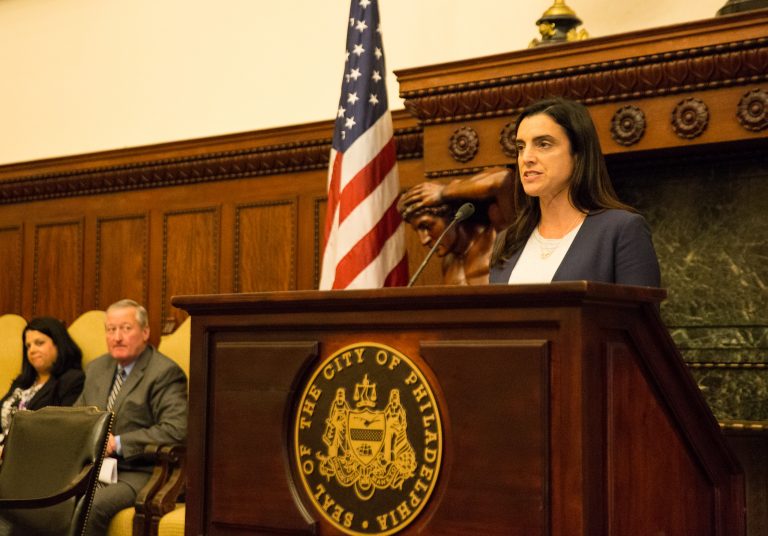Philly updates sexual harassment policy in wake of blistering audit
The audit found the city’s current policy neither prevents, nor protects victims of sexual misconduct or harassment.
Listen 2:13
File photo: Philadelphia City Controller Rebecca Rhynhart (Lindsay Lazarski/WHY)
Responding to a blistering performance audit by City Controller Rebecca Rhynhart, Philadelphia Mayor Jim Kenney issued an executive order Thursday updating the city’s sexual harassment policy. The audit found the city’s current policy neither prevents nor protects victims of sexual misconduct or harassment.
“What we found was an inadequate and poorly implemented policy, a convoluted system for reporting complaints, ineffective procedures, nonuniform punishments, insufficient trainings, and an overall lack of clarity around how to address sexual misconduct,” said Rhynhart, who began the audit when she took office in January.
The audit was sparked by the #MeToo movement, as well as a $1.25 million settlement reached last year between the city and a female Philadelphia police officer who was allegedly assaulted by a male superior. The city has also verified multiple allegations of sexual harassment against Sheriff Jewell Williams.
The audit reveals that most sexual harassment and misconduct complaints are handled on a department-by-department basis with little consistency in addressing and documenting incidents. Employees are not aware of the best way to file a complaint, and supervisors lack adequate training on how to investigate them.
Nearly 60 percent of managers and executive staff have not undergone the required sexual harassment-prevention training within the last five years.
The Philadelphia Police Department, the Commerce and Parks and Recreation departments, the Board of Ethics, the City Representative’s office, the Board of Revision of Taxes, and the managing director’s office all failed to provide regular sexual harassment training for all employees.
“There are employees in different supervisory positions in the city that have sexually harassed employees, that continue to work for the city, and that’s not OK,” Rhynhart said. “That’s why the change that needs to occur is so significant.”
‘Inappropriate comments to groping to assault’
Rhynhart reviewed 121 complaints lodged between July 2012 and April, including cases of verbal harassment, sexual misconduct, and coercion.
“We’ve seen everything from inappropriate comments to groping to assault,” said Rhynhart.
The number of complaints reviewed doesn’t capture the full scope of the problem, she said. Her team heard from multiple employees who said they filed complaints, but auditors could not find corresponding documentation.
The audit shows 33 out of 39 city departments either didn’t properly document complaints or send copies to the appropriate authorities.
About half of the complaints were investigated and verified, while 53 were investigated but could not be substantiated. A few remain under investigation.
Of the cases reviewed, the city paid out $2.2 million in settlements and punitive litigation costs. However, the audit noted, the costs may be greater because the city’s law department does not distinguish sexual harassment lawsuits from other lawsuits that fall under gender discrimination.
When a complaint was investigated and verified, the report showed, disciplinary actions for similar infractions varied widely between departments.
“Several departments issued suspensions between one and three days for inappropriate conversations,” Rhynhart said. “While another department merely issued a written warning for an employee groping a co-worker.”
In five cases, punishments were more severe for lower-level employees than for supervisors.
After disciplinary action occurred, Rhynhart found no requirement for supervisors to follow up with the employee who made the complaint in the first place, often leaving that worker feeling unprotected and lacking closure.
When elected officials and department heads are accused of sexual harassment or misconduct, Rhynhart found there are no special procedures in place.
As it stands now, final case files and completed investigative findings go to department heads, and the appropriate disciplinary actions are determined.
“We found that the completed substantiated claim against the sheriff was delivered to the sheriff himself in 2018,” Rhynhart said of Williams’ case.
Training for all by end of ’19
Kenney’s executive order and legislation initiated by City Councilwoman Blondell Reynolds Brown take the first steps in addressing some of these issues.
During the primary election in May, a majority of Philadelphia voters approved a charter change to require that all city employees — elected and appointed — take part in training every three years to prevent sexual harassment.
“Hopefully, we are showing [employees] have an opportunity now not to be afraid to step forward, not to be afraid to speak up, and that their government and their city will support them in being protected and working in a safe environment,” Kenney said.
The mayor said he accepts the controller’s audit and will work on her recommendations.
“This is obviously a situation that has existed both in government and in the private sector for generations,” Kenney said. “Probably in the bad old days it was even worse than it is now because the attention that’s being brought to it with #MeToo and women standing up and not taking it anymore and demanding change.”
Jane Slusser, the mayor’s chief of staff, said the city has designed a plan to ensure that all employees are trained by the end of 2019, beginning with managers and executive staff.
She stressed that the training will be tailored according to department and will include online sessions.
The city has also added a new online form for employees to file complaints as an option to going directly to a manager or a designated officer.
Monica Marchetti-Brock, the city’s director of labor relations, said her office will now monitor complaints as soon as they are filed until they are resolved.
“Every complaint should be investigated in the same manner. There should be uniformity and consistency in that investigation,” she said. “The key is that we’ll be able to track that investigation, and that’s different than what we’ve had previously.”
Marchetti-Brock added that her department will also examine disciplinary recommendations to ensure uniformity across departments.
The city plans on reviewing its sexual harassment and prevention policy annually.
WHYY is your source for fact-based, in-depth journalism and information. As a nonprofit organization, we rely on financial support from readers like you. Please give today.





